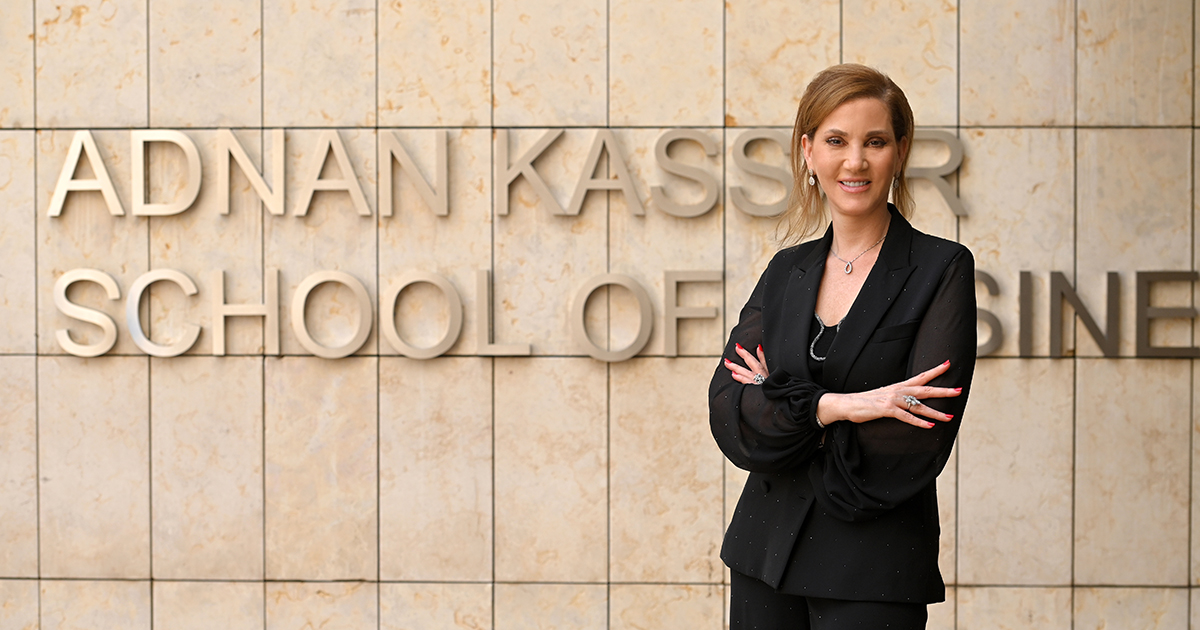AKSOB’s New Dean, Dr. Dima R. Jamali, Will Drive a Bold Vision for Innovation and Global Impact
An internationally recognized scholar and leader, Dr. Jamali plans to drive impactful research, partnerships and future-ready business education.
Her appointment sets the school’s course toward greater regional relevance and global recognition through impactful research, transformative learning and dynamic engagement with industry.
Outlining her vision for AKSOB, which is closely aligned with the university’s strategic pillars, her goal, she said, was to position the school “as a catalyst for innovation and societal impact, and producing future business leaders who will navigate disruption, shape sustainable economies and drive inclusive prosperity.”
Enhancing research excellence
Ranked among the top 2 percent of scientists globally in sustainability, Dr. Jamali brings to LAU a robust research portfolio and a deep commitment to academic excellence. Acknowledging that LAU already benefits from “a strong infrastructure,” the next step, she said, is to build on this foundation through greater institutional support, faculty mentorship and expanded funding mechanisms.
Accordingly, Dr. Jamali plans to introduce initiatives, such as weekly research seminars and research clusters, aimed at increasing productivity and collaboration.
“We must establish global partnerships, secure external funding and celebrate research success stories that inspire a culture of ethical and collaborative inquiry,” she said. “Global partnerships enable impactful, visible and highly cited research, and we will work to connect LAU faculty with counterparts across Europe, the US and the MENA region to boost our research footprint.”
Educating for impact
Dr. Jamali’s educational approach centers on the belief that traditional teaching methods are no longer sufficient. “Our students are digital natives,” she maintains, hence the need to “enhance practical, immersive and values-driven learning that engages them fully,” inside and outside the classroom.
This can be achieved by integrating problem-based learning, virtual reality, flipped classrooms, simulations and hosting guest speakers, as “students often learn more through experiences and collaboration than through conventional lectures.”
Notably, Dr. Jamali aims to embed three cross-cutting themes—sustainability, artificial intelligence and entrepreneurship—in all programs, aligning with the United Nations’ 2030 Sustainable Development Goals (SDGs), and empower graduates to become agents of change in their communities. By connecting course content and student projects to the SDGs, she said, “we encourage our students to develop creative solutions to local, regional and global challenges.”
Inspiring innovation and future leadership
As digital transformation reshapes the workplace, Dr. Jamali sees the integration of emerging technologies into education as paramount. “Classical teaching is becoming obsolete,” she explained. “To stay relevant, we must embrace adaptive AI platforms and shift toward skills-based education that nurtures the competencies of the future.”
Referencing the World Economic Forum’s Future of Jobs Report 2023, which identifies 10 indispensable core skills for graduates—such as critical thinking, creativity, resilience and tech fluency—she added “the more we integrate digital tools like simulations, open educational resources and peer learning, the more effectively we will equip students to thrive in the modern job market.” This transformation equally extends to faculty development and empowering instructors to innovate and adapt.
Advancing partnerships through the LAU business hub
Dr. Jamali views the LAU business hub as a strategic platform for bridging academia and industry, “a space for innovation, experimentation and real-world learning.”
Drawing on her experience in building similar hubs, she underscored their role in supporting students’ professional development through industry mentorship, seed funding, investor connections, and accelerator networks, by allowing them to “test their ideas, refine their prototypes and build networks that support their entrepreneurial journeys.”
She also underscored the importance of engaging the school’s advisory board in developing curricula that address industry needs. “Executives and industry leaders should be directly involved—not only in advising on curriculum but also in mentoring our students and helping them align their work with market realities,” she said.
Such partnerships are essential for maintaining the relevance and impact of business education, enabling joint ventures in research, executive training and policy advisory services, she added.
Leadership and vision
With over 25 years of academic leadership experience across institutions in the MENA region and internationally, Dr. Jamali articulated a vision for AKSOB as a world-class institution grounded in ethical leadership and societal engagement.
Central to her leadership approach is a dual focus on local relevance and global visibility. “For our work to be meaningful, it must be rooted in the local context while aligned with global agendas,” she explained. “Sustainability and artificial intelligence are global issues, but their applications must be tailored to local realities.”
She believes that the Association to Advance Collegiate Schools of Business (AACSB) accreditation offers a platform to bridge these perspectives, creating a shared language and framework for business schools worldwide. “Whether in Lebanon, Spain or the US, we face similar challenges—and AACSB helps align us around the core values of innovation, impact and ethics.”
Looking ahead
Under Dr. Jamali’s leadership, AKSOB is poised to expand its influence through stronger research, forward-thinking education, strategic partnerships and a renewed focus on real-world impact. “This is a shared mission that aligns with the university’s strategy to be globally recognized, regionally relevant and socially impactful,” she said.
